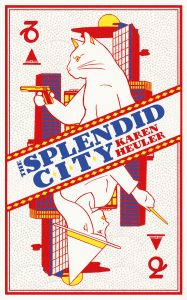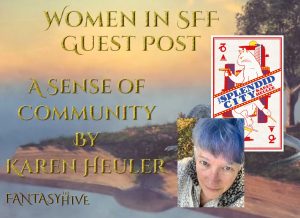A Sense of Community: GUEST POST by Karen Heuler (THE SPLENDID CITY)
A Sense of Community
By Karen Heuler
I have never been a witch, but I wouldn’t mind it. As I understand it, having done some research for my book, The Splendid City, and watched some TV shows or maybe just remembered them, the fun part of witchcraft is casting spells and doing transformations. I wonder if a lawn chair was the preferred flying craft for an older witch with physical disabilities.
Generally speaking, witches must be sprightly if they’re flying on broomsticks; they’re just so awkward. But logically, that can’t be so. I have one (young) witch ask an initiate why the un-sprightly older witch can’t just cure herself through magic. Ah! She’s still subject to nature.
Witches respect nature. They are an old religion in tune with the earth and with the cosmos.
They are also typically a community. That part is what really cheered me on as I wrote this book. They support each other, test each other, tease each other, and insist on following their morality. If you err, you have to redeem yourself or fall out of the community. My witch character errs. She does something unauthorized and has to learn how not to be the kind of person who does this.
 I’m not really altogether sure that I’d fly. I’m afraid of heights. My flying dreams, however, always keep me six feet above the ground, moving about as fast as a walking human, so I suppose I could just imitate that height and speed. It could be relaxing. I think I really just want to levitate, not fly. When I was a freshman in high school, our gym teacher led us on a levitation exercise. Now, mind you, this was a Catholic school, and I’m pretty sure the Church didn’t approve of non-saints levitating, but it happened, and I was chosen to be the student who was raised.
I’m not really altogether sure that I’d fly. I’m afraid of heights. My flying dreams, however, always keep me six feet above the ground, moving about as fast as a walking human, so I suppose I could just imitate that height and speed. It could be relaxing. I think I really just want to levitate, not fly. When I was a freshman in high school, our gym teacher led us on a levitation exercise. Now, mind you, this was a Catholic school, and I’m pretty sure the Church didn’t approve of non-saints levitating, but it happened, and I was chosen to be the student who was raised.
I laid down on the gym floor, closed my eyes, and girls crouched down and put I think their index fingers under my ankles, knees, waist, and shoulders, and I ascended. It didn’t feel like being picked up by human means, by the way, if that’s what you’re thinking. It was smooth and steady.
And then they put me down.
The seeds of flying were placed in my mind then. I wasn’t called to the principal’s office for that (no one betrayed us), but I was called to the office later on to be chastised about a science experiment I was doing on Telepathy. I had instructed a bunch of girls to sit down at a certain time and draw whatever was in their heads—I would meanwhile be projecting an image to them.
The priest was also called in and stood beside the principal. I was warned. I had almost breached the border of organized religion and gone somewhere else.
It seems that witches or would-be witches tend to overstep. My science project wasn’t a success—the results were average—but no other student had needed the priest to be called in. Only I had that power.
I love the idea of community in witchdom; I put a lot of it in my book, as Eleanor learns she does indeed have powers and is invited into the coven to learn the rules of the Craft and to become a member of a community. I love this. I was a literary writer for a number of years (frankly, I still am) before I jumped into SFF. Once I was there I did indeed find a much more accessible and inviting community, a little bit like Eleanor did. Shared values, open appreciation of other talents, an interest in the way the universe works, a love of the beauty to be created—my SFF community may indeed be a coven! In a sense, Eleanor’s initiation reminds me how eager we can be to join a community that has a value to us.
Work of course is a community, and Eleanor’s co-worker Stan and her boss represent a failed community for her, just as the coven represents a successful one. I think we’ve all had good jobs that we left because the atmosphere or people were bad, and meaningless jobs we stayed at because the people were good. That leap from Eleanor’s being in the wrong place to finding herself in the right place was one I enjoyed writing immensely. I’ve experienced it myself. I loved the comfort and growth she found, finally, and the way she became more representative of her true self.
That’s what a good community does—it supports and encourages and aids growth through honesty about our faults and encouragement when we grow. Shared values make us stronger and make the value increase. I have grown tired of stories where one person sets out on a quest to find a remarkable, saving token. The group, the coven, the government should find it, or else it becomes a private and personal win. I’m the kind of person who agrees with Groucho Marx, who wouldn’t want to be join any club that would accept him as a member, but I now find myself in a community of writers, and it’s important to me. Nothing we do in life is easy, but companions in any effort add strength and determination. And joy.
The witches’ symbol is the pentagram—a five-pointed star that represents the elements plus spirit, and by extension, the cosmos. If it’s upside down, it represents the dark forces. The witches worked together, and their rituals were physical manifestations of their joint beliefs. The missing witch that Eleanor is sent to find is an indicator that the community is broken and must be healed, as many of us now feel about our society. I hope we can heal that too, soon.
Karen Heuler is the author of The Splendid City. Her stories have appeared in over 100 literary and speculative magazines and anthologies, from Conjunctions to The Magazine of Fantasy and Science Fiction to Weird Tales, as well as a number of Best Of anthologies. She has received an O. Henry award, been a finalist for the Iowa short fiction award, the Bellwether award, the Shirley Jackson award for short fiction, and a bunch of other ritzy awards. Her stories and books often feature women facing strange circumstances on this world and others. Karen Heuler lives in New York City with a large dog and two alarmed cats.
The Splendid City is AVAILABLE NOW from Angry Robot

